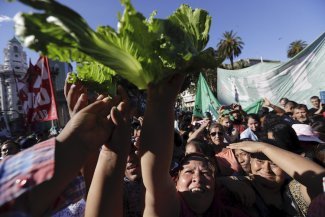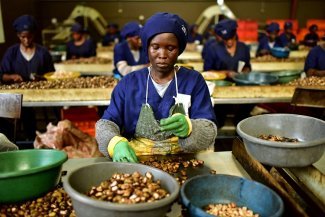The globalised and financialised agri-food system not only has a serious socio-environmental impact, but it is also tremendously inefficient and a risky bet if the aim is to guarantee food supply.
António Guterres, the UN secretary general, warned on 18 May that the coming months threaten “the spectre of a global food shortage”. The rise in the cost of basic foods – the price of wheat has risen by more than 50 per cent so far this year – could have a devastating effect on low-income countries. The war in Ukraine alerted the world to the possibility of a food crisis – Ukraine and Russia produce 12 per cent of globally traded calories, 28 per cent of globally traded wheat, 29 per cent of the barley, 15 per cent of the maize and 75 per cent of the sunflower oil. These figures are provided by The Economist in an article bearing the ominous title The coming food catastrophe.
The problem, however, is not new; nor is it limited to the situation in Ukraine. Rather, it is just making visible what the scientific community and environmental activists have been warning of for decades – the globalised and financialised agri-food system not only has a serious socio-environmental impact, but it is also tremendously inefficient and a risky bet if the aim is to guarantee food supply. In a recent article, researchers from the University of Padua state that “trade dependency thus appears to limit food security in food importing countries” and establish an inverse correlation between increased global trade and the resilience of the agri-food system.
“You cannot feed the population with annual crops using oil that destroys life in the subsoil on which the nutrient cycle depends. We urgently need to transform the way we grow crops,” says Gustavo Duch, coordinator of the magazine Soberanía Alimentaria.
Industrial agriculture, the veterinarian and writer notes, depends on phosphate mines in Western Sahara to produce inorganic fertilisers for use in Ukraine, where wheat and maize are produced. Together with soya brought from the Southern Cone of Latin America, this wheat and maize serves as the basis for producing feed for livestock that are fattened in Spain and later exported to northern Europe and China.
This is just one example of the irrationality of a globalised system that is totally disconnected from both local needs and available natural resources, and extremely dependent on oil both for the manufacture of agrochemicals and for the transport of raw materials from one corner of the planet to another. “To turn agriculture into an industry is to sacrifice the future of those who have yet to be born,” concludes Duch.
“Globalisation treats food as if it were a commodity and not a right, while against this background companies are getting bigger and bigger,” says Blanca Ruibal, coordinator of Friends of the Earth Spain.
The fundamental problem is that food is being treated as a commodity, just another raw material to bought and sold on the market, often in a speculative manner, and with an oligopolistic inertia that has left the trade in basic foods to a handful of multinational companies, such as the grain traders Cargill, Bunge and Louis Dreyfus.
Over the past 20 years, trade links have multiplied, such that some countries are exporting evermore, while others become increasingly dependent on imports. When something disrupts the system – as happened during the pandemic, and more recently with the Russian invasion of Ukraine – the risks of leaving the food supply in the hands of global trade become apparent. A commitment to agroecology could therefore be not only a question of social and ecological justice, but also the most realistic option for curbing hunger, which affects more than 800 million people and could threaten many more in the near future.
The logic of commodities versus the logic of food
“We must focus predominantly on crops that are adapted to our ecosystem, and produce to eat, not to sell,” says Ruibal, who stresses the significance in Europe of the Common Agricultural Policy (CAP), which has a huge budget and is therefore capable of guiding what, how and by whom food is produced. The latest reforms indicate that we are moving towards a greener agricultural policy, where environmental concerns are gaining in importance: the From Farm to Fork strategy sets the objective of reducing the use of chemical pesticides and fertilisers by 50 per cent by 2030, and of ensuring that at least 25 per cent of agricultural land in the European Union is dedicated to organic farming.
However, the CAP sidesteps the question of who should produce our food. “Food should be produced by farmers, not by big companies; environmental policies could end up putting even more obstacles in the way of small producers. We are at a delicate moment, in which a greener CAP could do yet more to push out the small producers,” says Ruibal.
Given this context, the debate can be framed in terms of food sovereignty – or, as Ruibal proposes, agrarian justice – rather than in terms of a dichotomy between agroecological production versus agroecology.
“A crop produced by a small farmer is not always ecological. There is a cooperative sector that is connected to agribusiness, which uses agrochemicals which are linked to environmental problems; but the money stays in the country, and there is a long-term view. For example, there is crop rotation, which goes against the mining logic of agribusiness. What we see are two opposing models of food production based on two different logics – one is directed outwards, towards international markets, which is the logic of commodity production; and the other, inwards, anchored in local consumption needs, which is the logic of food production,” explains Alexandre Roig, president of the National Institute of Associativism and Social Economy (INAES) in Argentina, a country that has both an enormous capacity for food production and is at the same time heavily dependent economically on global markets.
For Roig, policies that lead to sustainable and fair agriculture are viable. He gives an example: “To make [the Argentinian province of] Chubut sovereign in milk produced by cooperatives would require an investment of around $5 million [€4.9 million], which is a very affordable cost. The measures we are proposing are cheap and doable, such as the possibility of growing fresh produce in the cities. It is feasible, it is anchored in local production and there is political will.”
There is undoubtedly a growing perception of the risks involved in the current model in social, environmental and food supply terms. But two major difficulties persist in transforming the way we grow and eat food. One has to do with the political and economic power accumulated by companies such as the big sellers Bunge and Cargill and biotech companies such as BASF and Bayer. The other has to do with concepts as what some authors have called the “myth of progress” still holds sway – the belief in unlimited growth and technological innovation that is uncritically equated with development, while the rural world is despised as being synonymous with backwardness.
This same concept of progress can lead to false solutions based on geoengineering and technological innovation. “When water shortages become a problem, hydroponic crops are proposed as the solution. But there is not only a shortage of water; there is also a shortage of potassium, phosphates and so on. If you look at it holistically, technological solutions don’t work,” says Ruibal.
Transition with an internationalist approach
Another challenge is the need to think in terms of transition, and to do so from an internationalist standpoint. We cannot switch at a stroke from a model that is extremely dependent on international trade to one anchored in local production. In the article cited above, The Economist warns that implementing protectionist policies could lead to famine in the countries most dependent on food imports.
It is a gradual process that needs to be planned and must take into account the environmental debt owed by the countries of the North after centuries of colonial exploitation. “As with climate justice, the countries that suffer the most from the harmful consequences of the agri-food model are often those least responsible,” says the Friends of the Earth Spain coordinator.
What is clear is that some countries that are net food importers have reached this situation as a result of the structural adjustment policies of the 1980s and 1990s, the time when globalisation and the current agri-food system were being consolidated; this is particularly true of the sub-Saharan Africa region. In Ruibal’s view, it would be worth taking inspiration from the mechanisms being considered for climate justice, so that the countries of the Global North help finance the agri-food transition in the South, while CAP policies could play a key role in guiding a just transition to another more equitable, resilient and sustainable agri-food model in Europe.












